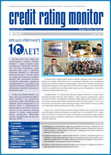Credit-Rating: Demand in Foreign Markets Boosts Ukraine’s Industry Growth
 According to Credit-Rating, a GDP growth rate in 1Q2010 was recorded
around 5% versus the similar year-earlier period. In our view, in the upcoming 2 months
the industrial activity will be underpinned by the situation in the foreign markets. The
national metallurgical companies increased their output rates in March, driven by
continuing growth of steel and commodities prices in the world (a 26% growth compared to
March 2009). The majority of national metallurgical companies have concluded contracts
for their produce by April and May, which allows expecting retention of volumes in this
sector in short term. However, Credit-Rating notes that despite revival in the sector,
the financial state of a number of large metallurgical companies remains rather
difficult, with debt-related issues being unsolved, which, in a number of cases, makes
the companies seek investors.
According to Credit-Rating, a GDP growth rate in 1Q2010 was recorded
around 5% versus the similar year-earlier period. In our view, in the upcoming 2 months
the industrial activity will be underpinned by the situation in the foreign markets. The
national metallurgical companies increased their output rates in March, driven by
continuing growth of steel and commodities prices in the world (a 26% growth compared to
March 2009). The majority of national metallurgical companies have concluded contracts
for their produce by April and May, which allows expecting retention of volumes in this
sector in short term. However, Credit-Rating notes that despite revival in the sector,
the financial state of a number of large metallurgical companies remains rather
difficult, with debt-related issues being unsolved, which, in a number of cases, makes
the companies seek investors.
A growth in machine-building sector (by 34% versus March 2009) was bolstered by the foreign demand. The domestic demand will remain volatile, and, in Credit-Rating’s opinion, the recovery of machine-building sector that operate for the domestic market will occur no earlier than stabilization in other real sectors of economy, and than full resumption of banking lending.
In construction sector, despite of increased volume of works, the level of activities of companies did not allow to reach year-earlier indicators. In 1Q2010 the construction works were performed by 78.6% versus year-earlier figures (in comparative prices), which is explained by poor solvency, limited access to lending for both companies and investors. An anticipated revival to be boosted by funding projects for Euro-2012 seemed hard to achieve, since the volume of funding of these projects is insignificant. We may note positive expectations of investors in March regarding resumption of activity in residential and commercial property sectors. In our view, the growing investors’ interests is mainly explained by concerns of potential investors regarding depreciations of their savings in foreign currencies under appreciating national currency, than by positive shifts in real sector of economy.
As the agency predicted before, March saw a slight increase of activity in retailing sector. Even though, the turnover indicators of chain retailing remains under those recorded in the past ‘disastrous’ year (97% in January-March 2010 versus similar year-earlier period). We do not expect vigorous recovery in this sector, which is explained by a number of reasons. To name a few are: low pace of restoring population’s incomes, and, consequently, of consumption. We should also note re-orientation of chains to cheaper segments of goods and shrinking sales mixes; rising share of organized markets in the retail segment, which weighs on earnings from sales. Credit-Rating also notes that after restructuring of retailers’ debts, their expenses for servicing have increased. In case the turnovers remain at approximately previous year’s levels, this will renew troubles with servicing and repayment of borrowings and will make companies lure investors for purchasing shares in their businesses.
According to the agency’s estimates the growth of agricultural sector was moderate (5.3% in 1Q2010 versus the similar year-earlier period). Credit-Rating notes that the urgent question for the companies remains access to lending and consequently to funding of their activities. As of today, the banking sector’s attitude to lending to agricultural companies remains rather restrained due to the risks associated with hampered control over use of inventory and monetary resources. In our view, in order to create conditions for further development of the national agricultural sector there should be provided substantial financial aid from the state.
In short-term perspective we expect maintaining business activities in industrial sector. The growth drivers remain metallurgy and machine-building companies. The economic activity of construction and retail companies in the current year will not substantially exceed previous year’s level and will be constrained by poor growth of effective demand and by absence of considerable investments or lending to these sectors.
Credit-Rating agency has operated in the Ukrainian market since 2001 being committed to assignment of the national scale ratings. The agency has assigned 1081 ratings. As at Apr. 1, 2010 the agency’s list of ratings include 646 ratings: 502 in corporate, 98 in financial and 46 in municipal sectors. In March 2010 the agency assigned 4 ratings, revised 210 ratings, suspended 32 ratings and withdrew 18 ratings.
Information on all credit ratings assigned in accordance with the National Rating Scale may be found in REUTERS and BLOOMBERG information systems.
For more information, please contact:
Information and
analytic department
Sergey Rozumyak +38044490 25 50
SRozumyak@credit-rating.com.ua
Denis
Rudenko
DRudenko@credit-rating.ua





